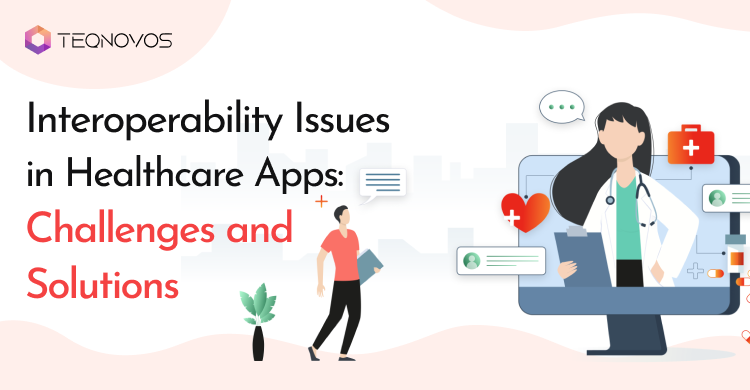Interoperability Issues in Healthcare Apps: Challenges and Solutions
The digitalization of typical healthcare facilities is one of the major trends in the medical sector of late. Almost all healthcare service providers today rely on custom healthcare apps for improved data management and personalized patient care.
As per a report, the healthcare app industry generated around $3.43 billion in 2023, i.e., 9.9% more than the previous year. It’s also worth noting that healthcare is growing significantly faster than other prominent industries, such as media and manufacturing.
However, despite the fast-paced advancement in healthcare technologies, ensuring interoperability among healthcare apps presents a serious challenge. Therefore, in this blog, we will discuss all about healthcare app interoperability, common challenges, and strategies to overcome them.
What is Interoperability in Healthcare Apps?
Interoperability in healthcare is referred to as the ability of healthcare systems to communicate seamlessly with other medical applications. It is the method that defines how successfully healthcare apps can access, share, integrate, and coordinate with different medical devices.
Since it has always been difficult to manage and share health data securely, healthcare interoperability is a must for medical companies. It allows healthcare providers to harness the power of scalable healthcare applications for transparent and efficient data transfer.
One of the top highlights of healthcare interoperability is that apps can share information across geographical boundaries. By achieving enhanced interoperability, healthcare companies can ensure uninterrupted, secure, and faster information portability.
The Four Levels of Healthcare Interoperability
Interoperability is a vast concept divided into four levels that perform a unique role in helping medical apps exchange health data. Let us take a look at these healthcare app interoperability levels before you opt for custom healthcare application development.
1. Foundational Level
As the name suggests, the foundational level is a basic level of healthcare app interoperability but is also the most important one. It caters to a healthcare system’s communication requirements by setting up a secure communication channel for easy exchange of messages across healthcare apps.
However, at this level, your tailored healthcare solutions are unable to process the data exchanged clearly. It is dedicatedly designed to let medical applications communicate and receive data from other systems.
2. Structural Level
The structural level is the second on the list of healthcare app interoperability levels. It relies solely on the format of the data and ensures that data exchanged in similar formats can be easily interpreted. This level makes it comparatively easier for healthcare systems to automatically detect and interpret data types.
When medical data is transferred from one system to another through this tier of healthcare interoperability, the original context is preserved. This is fundamental to overall healthcare interoperability.
3. Semantic Level
Semantic interoperability is all about utilizing medical data in a standardized way by breaking it down for enhanced comprehension. At this level, two different healthcare apps have a mutual understanding of similar medical terminologies, vocabularies, and symbols, enabling precise interpretation of medical data.
It is considered one of the top levels of healthcare interoperability. It is so because semantic interoperability allows the data transferred between two systems to be easily understood by both sides.
4. Organizational Level
The last level of interoperability in healthcare apps is referred to as the organizational level. This covers your legal, social, and other social considerations that are important for a secure, fast, and seamless swapping of information between two healthcare systems.
For medical companies to achieve the highest level of organizational interoperability, they require steady workflow and business continuity. It lets them deliver health data across multiple software effectively.
Challenges Associated with Healthcare App Interoperability
As important as healthcare interoperability is in the modern business landscape, it sure comes with its share of challenges. For medical professionals such as yourself to overcome long-standing interoperability issues, you first need to identify these challenges.
Here are some of the key challenges around interoperability in healthcare apps that you must know about. Learn about them below, and then opt for custom healthcare app development services.
1. Poor Coordination Among Healthcare Providers
Healthcare app interoperability cannot be attained unless medical organizations maintain seamless coordination among themselves. Right now, different healthcare facilities follow different standards and regulations for interoperability. It will be much easier if everyone follows the same standards uniformly.
This is perhaps the biggest medical interoperability challenge, as without coordination, no strategies will work. Leaders of the medical sector must come together to create a dedicated interoperability strategy.
2. Technological Heterogeneity
When it comes to improving interoperability in healthcare apps, the use of diverse technologies across companies is a major challenge. This is also called technological heterogeneity and plays a major part in hindering healthcare interoperability. Medical professionals must overcome this to achieve interoperability.
Different healthcare organizations use varying technologies based on preferences, budget, availability, etc. This causes a major communication gap between healthcare apps, leading to inaccurate data exchange.
3. Limited Budgets of Healthcare Companies
Healthcare interoperability solutions cannot find their way into the healthcare sector until all organizations are on the same page financially. Some medical facilities are earning significantly more than other companies and can easily invest in tech resources to eliminate interoperability issues in healthcare.
On the other hand, some companies might not be able to scrape enough money from their budget. There are government-allotted grants and other measures that make interoperability expenses affordable for all.
4. Data Security and Privacy Concerns
Another common concern around interoperability in healthcare apps is the app’s ability to ensure data security and privacy compliance. Since healthcare interoperability solutions increase the flow of sensitive patient information across systems, the risk of cyber threats is higher than usual.
Data breaches, access to medical records, identity thefts, etc. are a few risks that poor data security brings to interoperability. This issue must also be taken into account for healthcare app development.
Top Solutions to Deal with Interoperability Issues in Healthcare Apps
The growing acceptance of healthcare applications and software across businesses showcases the importance of healthcare interoperability. However, achieving interoperability might be difficult for businesses that don’t know how to deal with its major challenges.
Therefore, to help businesses ensure interoperability in healthcare mobile apps, we have listed a few solutions for the same. Implement these solutions to eliminate healthcare interoperability issues.
1. Define Your Interoperability Goals Precisely
The first and fundamental strategy for interoperability in healthcare is to define clear objectives beforehand. Industry leaders and decision-makers should discuss the desired level of interoperability in advance and create strategies around it. This will prevent unwanted delays and aimless planning.
The potential healthcare interoperability solutions must fulfill the data exchange and information sharing needs of all healthcare organizations. Setting precise goals is a great way to get the desired results faster.
2. Make Data Security Your Priority
Prioritizing data security and implementing relevant strategies is the best way to overcome interoperability issues in healthcare applications. Avoid designing data security and privacy systems around a healthcare app, but vice versa. Make sure all your systems have and follow advanced privacy and safety standards.
Your healthcare system must use strong encryption protocols and secure access control to make certain that only authorized personnel can access data. Prioritizing security ensures a safe data transfer process.
3. Adopt a Standardized Format
Interoperability in healthcare apps is all about standardizing medical systems for the seamless exchange of health data among them. By adopting a standardized format all over healthcare facilities, attaining interoperability is just a matter of time. For this, healthcare professionals need to choose a specific format.
Once a format is chosen and implemented, decoding information received from other medical systems won’t be an issue. Moreover, because the format is the same, it also eliminates the risk of losing data.
4. Educate Doctors and Staff
A lot of issues with healthcare app interoperability arise due to a lack of knowledge among doctors and medical staff. So, you need to educate and train medical experts in your facility on how to use interoperability tools to send, receive, and maintain critical medical information correctly.
Doing so will ensure uninterrupted and faster transfers of data between two medical systems. This also improves healthcare professionals’ internal collaboration and keeps data security-related mistakes at bay.
Bottom Line
To say that interoperability is a must in healthcare apps would be an overstatement. With custom healthcare applications evolving continuously, it’s interoperability that will cater to the industry’s data management needs effectively. Hence, interoperability’s importance is already well established.
What concerns healthcare providers across the world are the challenges that interoperability comes with and how to overcome them. In this blog, we have mentioned all the prominent challenges and the best strategies to get past them to achieve interoperability. Go through these carefully and implement them.
While looking for a top healthcare app development company to build your app with enhanced interoperability, consider Teqnovos. We have a team of expert healthcare app developers who will build your custom application with advanced features that cater to your business and patients’ needs.
Frequently Asked Questions
1. Why is interoperability important in healthcare?
Healthcare interoperability is imperative for all medical service providers for advanced processes and easier communication between unique healthcare systems. With interoperability, healthcare professionals can have a better understanding of a patient’s medical record, allowing them to provide the best patient care. When a patient seeks medical support from different facilities, it’s interoperability that ensures a seamless flow of health data for consistency in overall medical treatment. Lastly, interoperability is crucial in healthcare apps for automated and error-free administrative processes across healthcare centers.
2. How do I deal with interoperability issues in healthcare applications?
Among the most promising ways of overcoming interoperability issues in healthcare apps are defining interoperability goals and adopting a standard format for healthcare data. This helps you figure out what interoperability level you should aim for and plan your strategies accordingly. Further, having a standardized format promotes higher interoperability by ensuring seamless transfer and comprehension of data. Training your staff on interoperability tools is also vital to dealing with interoperability issues.
3. What are the common challenges to healthcare interoperability?
There are certain challenges associated with healthcare interoperability that medical personnel must be aware of. The first major challenge is poor coordination between healthcare companies and professionals. When each facility deals with health data in its unique way, maintaining a standard format becomes challenging. Additionally, the lack of financial resources among certain businesses to invest in the latest healthcare software is also preventing them from achieving interoperability. These are a couple of major challenges that business leaders are facing in healthcare app interoperability.
4. What is the future of interoperability in healthcare?
When it comes to the future of healthcare interoperability, you can expect a drastic advancement in technologies facilitating a seamless exchange of information. You will most likely witness improvements in blockchain technologies designed to ensure intact security while flowing medical data from one system to another. Moreover, the rise of the latest AI technologies will also impact healthcare application development and interoperability. In the coming years, you can also expect valuable changes in government regulations around the exchange of a patient’s medical data between healthcare providers.
















